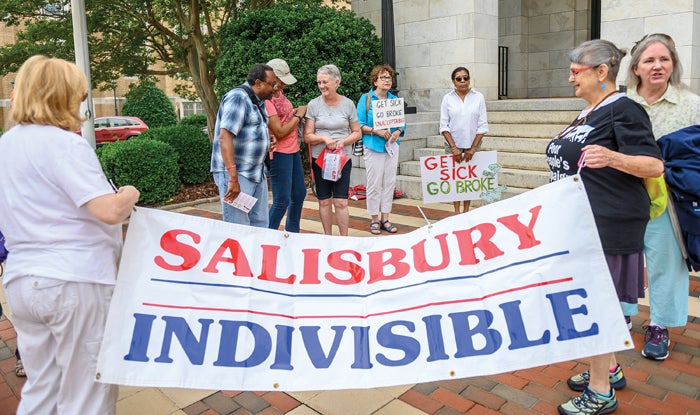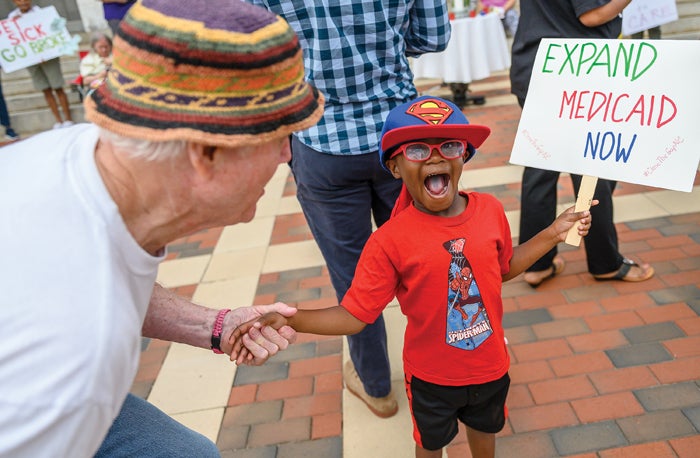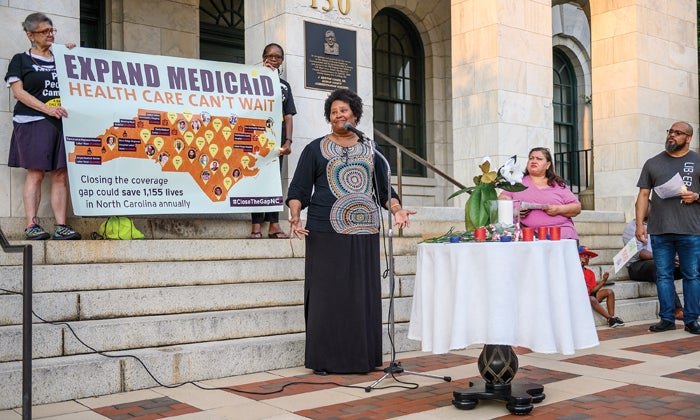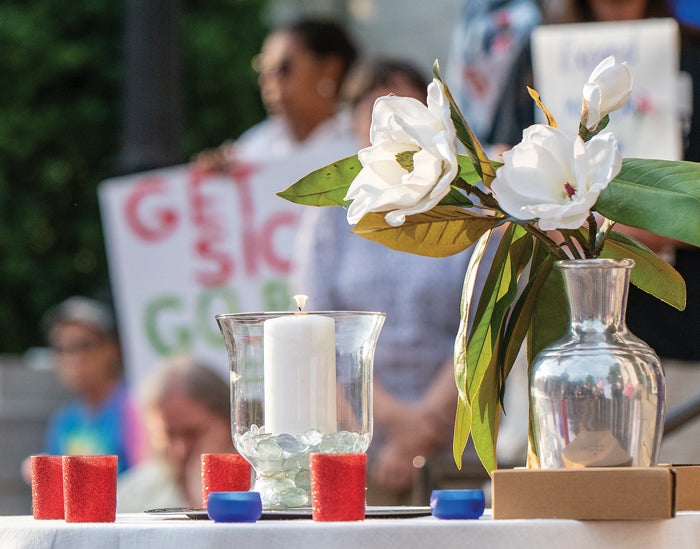Vigil highlights human cost of Medicaid coverage gap, calls for expansion
Published 12:00 am Thursday, June 6, 2019
SALISBURY — The Rev. Dr. Regina Dancy knows that some students at her workplace, Hood Theological Seminary, use their prayers to ask God to keep them from getting sick.
If students need medical attention, they may have to choose between essentials such as food and seeking health care because of their lack of health insurance. Their workplace may not be able to provide it, but they also do not make little enough to qualify for Medicaid.
About 60 people gathered around this issue for a Health Care Can’t Wait vigil at 7 p.m. Wednesday in front of the Rowan County administrative building in downtown Salisbury.
“This is the work that God has called us to do today,” said the Rev. Ladale Bensen to applause. “Because it is right.”
The North Carolina Justice Center, a left-leaning research and advocacy organization, planned the vigils in 22 cities and towns across the state. The Salisbury Circle of the Poor People’s Campaign organized the vigil here.
It was a call for state legislators to act. It also was a memorial for mothers, sisters, husbands, children and friends that have been negatively affected or died because they could not afford health insurance. A small table with candles and flowers, posters with slogans such as “patients for profits” and candles marked the occasion as people prayed, told their stories, and lit candles for those affected.
“Let’s face it,” said Mike-o Martelli, telling the crowd of his own struggles with health insurance. “It’s just a matter of time before I have to choose between death and debt.”
North Carolina is one of 14 states that haven’t expanded Medicaid eligibility to include more people under the Obama administration’s Affordable Care Act. Because of this, there is a lack of health insurance coverage for people who make too much to qualify for Medicaid under their state’s eligibility rules and too little to receive government assistance in purchasing a private plan. Medicaid is a federal program that provides health coverage to children, low-income adults, pregnant women, people with disabilities and elderly people.
In states that have expanded the program to the new eligibility requirements, people can qualify if their income is below 138% of the federal poverty level.
However, North Carolina has the seventh-highest uninsured rate in the nation with 13% of the residents uninsured, according to a 2016 study by the National Center for Health Statistics. Expanding the program would cover an additional 500,000 people, according to the N.C. Justice Center.
About 2 million North Carolinians currently qualify for Medicaid, one of the largest state-run federal programs in the state. The majority of the funding for the $14 billion annual cost comes from the federal government, which pays $2 for every $1 that the state contributes.
However, for those at the vigil, that is not enough. Speakers described problems they had faced with soaring costs, a lack of access to insurance and having to choose between feeding themselves or going to the doctor when they were in pain.
“For too many years, people have suffered and died without access to health care,” said Hyun Namkoong of the N.C. Justice Center “How many more lives?”
Moreover, vigil organizers at the Justice Center emphasized that waiting to expand Medicaid affects the economy of the state when workers in service, agriculture, hospitality and other industries are unhealthy due to a lack of insurance coverage.
The timing of these vigils is significant, as the North Carolina General Assembly is in the midst of budget negotiations. The name of the protest itself — Health Care Can’t Wait — speaks to the goal to urge lawmakers to include Medicaid expansion in their budgets.
Currently, neither the budget proposed by the N.C. House or Senate includes Medicaid expansion. The issue has been discussed and debated for some time, with Gov. Roy Cooper and Democrats bringing it up repeatedly during this legislative session.
“Expanding Medicaid is a common-sense step that would expand access to affordable health coverage for thousands of families while bringing nearly $4 billion into North Carolina’s economy, which would create nearly 10,000 jobs and help rural hospitals remain open,” said a news release from the governor’s office on April 23.
Republican lawmakers have put forth their own versions of Medicaid expansion that have been stuck in committee.
The 2019 House Bill 655 or N.C. Health Care for Working Families was introduced by Republican lawmakers. Its controversy, however, is rooted in the work requirement for some Medicaid recipients between ages 19 and 64.
Some Republican lawmakers have argued that expanding Medicaid would disincentivize people from working, as they became ineligible for the benefits if they made a certain amount of money.
Despite the Trump administration’s support, the provision of a work requirement for Medicaid eligibility in other states has been struck down by federal courts. Moreover, a study by the Kaiser Family Foundation has found that nearly 8 in 10 adults receiving Medicaid live in working families, and most work themselves.
Additionally, Republicans have expressed uncertainty about federal funding, which currently covers 90% of the costs of the program.
Rep. Harry Warren, R-76, emphasized the complexity of the problem as a roadblock to a quick fix. He said that in 2013 and 2014, the program was mismanaged and expensive, although lawmakers had worked to resolve that by 2016.
“Both sides, Republican and Democrat, are aware and working for a resolution to provide adequate coverage,” he said. “It’s not an issue that’s on the back burner.”
Many at the vigil expressed both sadness and frustration at lawmakers’ pace in addressing the issue.
“Our legislators lack morals,” said Andria Shores Cantrell, who teaches at Catawba College.
Cantrell’s daughter’s 27-year-old friend from Asheville passed away in an emergency room last year. She died of pneumonia. She was uninsured, so she waited to seek care.
Mayor Al Heggins spoke during the vigil after prayers and memorials.
“I’m so sorry you lost your mother in such a horrible way,” Heggins told Nye Hartwick, who had spoken earlier about losing her mother after the price of her medication skyrocketed.
“I’m sorry that I sound angry,” she continued. “But I am angry.”






